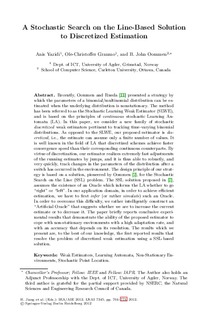| dc.contributor.author | Yazidi, Anis | |
| dc.contributor.author | Granmo, Ole-Christoffer | |
| dc.contributor.author | Oommen, B. John | |
| dc.date.accessioned | 2012-08-08T11:50:35Z | |
| dc.date.available | 2012-08-08T11:50:35Z | |
| dc.date.issued | 2012 | |
| dc.identifier.citation | Yazidi, A., Granmo, O.-C., & Oommen, B. J. (2012). A Stochastic Search on the Line-Based Solution to Discretized Estimation. In H. Jiang, W. Ding, M. Ali & X. Wu (Eds.), Advanced Research in Applied Artificial Intelligence (Vol. 7345, pp. 764-773): Springer | no_NO |
| dc.identifier.isbn | 978-3-642-31086-7 | |
| dc.identifier.uri | http://hdl.handle.net/11250/137963 | |
| dc.description | Published version of a chapter in the book: Advanced Research in Applied Artificial Intelligence. Also available from the publisher at: http://dx.doi.org/10.1007/978-3-642-31087-4_77 | no_NO |
| dc.description.abstract | Recently, Oommen and Rueda [11] presented a strategy by which the parameters of a binomial/multinomial distribution can be estimated when the underlying distribution is nonstationary. The method has been referred to as the Stochastic Learning Weak Estimator (SLWE), and is based on the principles of continuous stochastic Learning Automata (LA). In this paper, we consider a new family of stochastic discretized weak estimators pertinent to tracking time-varying binomial distributions. As opposed to the SLWE, our proposed estimator is discretized , i.e., the estimate can assume only a finite number of values. It is well known in the field of LA that discretized schemes achieve faster convergence speed than their corresponding continuous counterparts. By virtue of discretization, our estimator realizes extremely fast adjustments of the running estimates by jumps, and it is thus able to robustly, and very quickly, track changes in the parameters of the distribution after a switch has occurred in the environment. The design principle of our strategy is based on a solution, pioneered by Oommen [7], for the Stochastic Search on the Line (SSL) problem. The SSL solution proposed in [7], assumes the existence of an Oracle which informs the LA whether to go “right” or “left”. In our application domain, in order to achieve efficient estimation, we have to first infer (or rather simulate ) such an Oracle. In order to overcome this difficulty, we rather intelligently construct an “Artificial Oracle” that suggests whether we are to increase the current estimate or to decrease it. The paper briefly reports conclusive experimental results that demonstrate the ability of the proposed estimator to cope with non-stationary environments with a high adaptation rate, and with an accuracy that depends on its resolution. The results which we present are, to the best of our knowledge, the first reported results that resolve the problem of discretized weak estimation using a SSL-based solution. | no_NO |
| dc.language.iso | eng | no_NO |
| dc.publisher | Springer | no_NO |
| dc.relation.ispartofseries | Lecture Notes in Computer Science;7345 | |
| dc.subject | weak estimators | no_NO |
| dc.subject | learning automata | no_NO |
| dc.subject | non-stationary environments | no_NO |
| dc.subject | Stochastic Point Location | no_NO |
| dc.title | A Stochastic Search on the Line-Based Solution to Discretized Estimation | no_NO |
| dc.type | Chapter | no_NO |
| dc.type | Peer reviewed | no_NO |
| dc.subject.nsi | VDP::Mathematics and natural science: 400::Information and communication science: 420::Knowledge based systems: 425 | no_NO |
| dc.subject.nsi | VDP::Technology: 500::Information and communication technology: 550 | no_NO |
| dc.source.pagenumber | 764-773 | no_NO |
